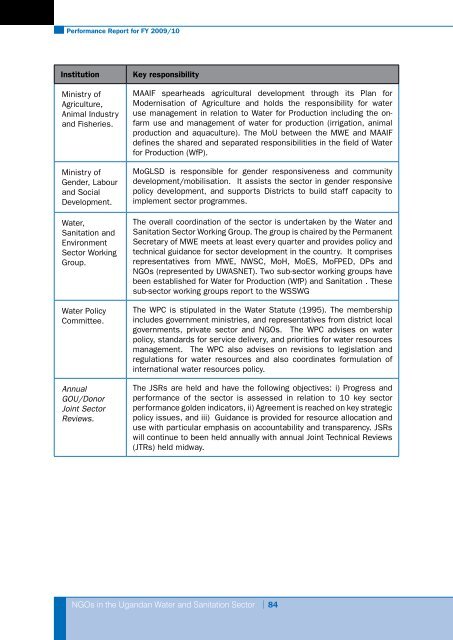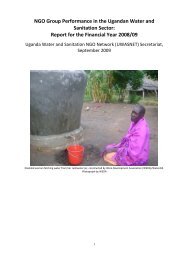Performance Report for FY 2009/10 - UWASNET
Performance Report for FY 2009/10 - UWASNET
Performance Report for FY 2009/10 - UWASNET
Create successful ePaper yourself
Turn your PDF publications into a flip-book with our unique Google optimized e-Paper software.
<strong>Per<strong>for</strong>mance</strong> <strong>Report</strong> <strong>for</strong> <strong>FY</strong> <strong>2009</strong>/<strong>10</strong><br />
Institution Key responsibility<br />
Ministry of<br />
Agriculture,<br />
Animal Industry<br />
and Fisheries.<br />
Ministry of<br />
Gender, Labour<br />
and Social<br />
Development.<br />
Water,<br />
Sanitation and<br />
Environment<br />
Sector Working<br />
Group.<br />
Water Policy<br />
Committee.<br />
Annual<br />
GOU/Donor<br />
Joint Sector<br />
Reviews.<br />
MAAIF spearheads agricultural development through its Plan <strong>for</strong><br />
Modernisation of Agriculture and holds the responsibility <strong>for</strong> water<br />
use management in relation to Water <strong>for</strong> Production including the onfarm<br />
use and management of water <strong>for</strong> production (irrigation, animal<br />
production and aquaculture). The MoU between the MWE and MAAIF<br />
defines the shared and separated responsibilities in the field of Water<br />
<strong>for</strong> Production (WfP).<br />
MoGLSD is responsible <strong>for</strong> gender responsiveness and community<br />
development/mobilisation. It assists the sector in gender responsive<br />
policy development, and supports Districts to build staff capacity to<br />
implement sector programmes.<br />
The overall coordination of the sector is undertaken by the Water and<br />
Sanitation Sector Working Group. The group is chaired by the Permanent<br />
Secretary of MWE meets at least every quarter and provides policy and<br />
technical guidance <strong>for</strong> sector development in the country. It comprises<br />
representatives from MWE, NWSC, MoH, MoES, MoFPED, DPs and<br />
NGOs (represented by <strong>UWASNET</strong>). Two sub-sector working groups have<br />
been established <strong>for</strong> Water <strong>for</strong> Production (WfP) and Sanitation . These<br />
sub-sector working groups report to the WSSWG<br />
The WPC is stipulated in the Water Statute (1995). The membership<br />
includes government ministries, and representatives from district local<br />
governments, private sector and NGOs. The WPC advises on water<br />
policy, standards <strong>for</strong> service delivery, and priorities <strong>for</strong> water resources<br />
management. The WPC also advises on revisions to legislation and<br />
regulations <strong>for</strong> water resources and also coordinates <strong>for</strong>mulation of<br />
international water resources policy.<br />
The JSRs are held and have the following objectives: i) Progress and<br />
per<strong>for</strong>mance of the sector is assessed in relation to <strong>10</strong> key sector<br />
per<strong>for</strong>mance golden indicators, ii) Agreement is reached on key strategic<br />
policy issues, and iii) Guidance is provided <strong>for</strong> resource allocation and<br />
use with particular emphasis on accountability and transparency. JSRs<br />
will continue to been held annually with annual Joint Technical Reviews<br />
(JTRs) held midway.<br />
NGOs in the Ugandan Water and Sanitation Sector | 84



